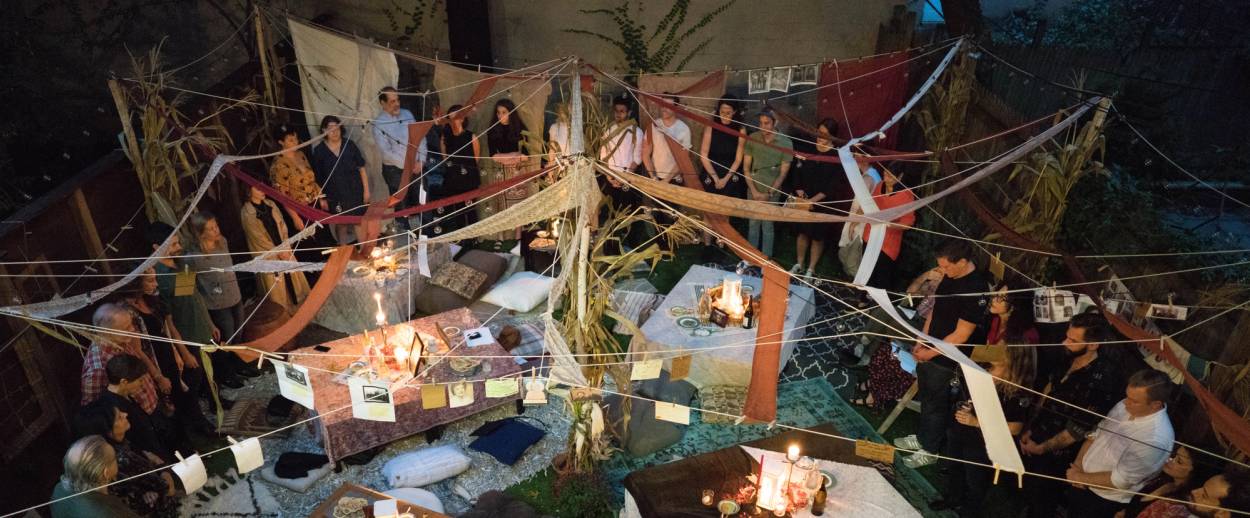As Many Head Home for the Holidays, Jewish Artists Ponder Just What ‘Home’ Means
From loss to joy to annoyance, wrestling with the places we come from




As so many of us are heading home for the holidays this week, it’s a great time to recall an experimental project that, earlier this year, tried to wrestle with the meaning of, well, home. Inspired by Sukkot, the project, Dwell, brought together Jewish artists of all disciplines to create a communal space that let everyone grapple with their conflicted feelings about home, from not having one to building one of your own.
In mid-October, a group of around 40 people gathered in a Brooklyn backyard under the most beautiful sukkah I have ever seen. Colorful textiles hung from a pole in the center of the yard, streaming in all directions and creating a vibrant structure. Through the fabrics you could see the night sky. The gathering was organized by Francine Hermelin, Adam Kantor, Iris Mansour, Benj Pasek, Rebecca Soffer, and Amy Taylor Rosenblum, as part of an initiative to make Jewish traditions modern and meaningful for a generation of young Jews.
It’s the second such event the group has organized. In April they hosted “Unleavened,” an intimate, immersive musical seder that featured performances from Danny Burshtein, who most recently played Tevye to Kantor’s Motel in Fiddler, Dear Evan Hansen and La La Land songwriter Benj Pasek, and Broadway legend Tovah Feldshuh. Both events were produced with funding from the Schusterman Foundation and Reboot.
The crowd at Dwell was hip and similarly theater-centric, filling the sukkah with a feeling of camaraderie and warmth. Guests were asked to bring with them an image of a relative, so that we would be surrounded by family. Some brought photos of family members long dead in villages that no longer exist, while others brought photos of loved ones currently living. There were frames for the more sensitive images scattered across the tables while the less sensitive images were close pinned onto the Sukkah.
I brought a picture of my Grandma Fanny and her four brothers, taken at my parent’s wedding. When I entered the sukkah, I was handed a piece of paper and told to write down what came to mind when I thought about family and feelings of being home. Then I was instructed to pin up what I had written on the sukkah. As I looked around at other people’s stories and recollections, I was reminded of how interconnected we all are as Jewish people. One woman drew a map of a village in Lithuania that no longer exists with a poem underneath that the author learned as a child from her grandmother. So many of us come from the same places and share stories of a home lost.
The evening began to really take shape when we were asked to sit around a series of tables spread throughout the sukkah. There we had a few moments to discuss our own families and our Jewish experiences before the performances began. There were readings and musical performances. Rebecca Soffer read from her forthcoming book, Modern Loss: Candid Conversation About Grief, recounting the experience of seeking a sense of home after the death of both of her parents. Musician Shaina Taub sang two songs about home—and the lack of home: “We Don’t Live Here Anymore” and “Room”. Iraqi refugee and activist Ahmed Badr recited his poem “Nakhal” about leaving his homeland. Lab/Shul Rabbi Amichai Lau-Lavie closed out the event by discussing the meaning of the holiday and telling a story about ritual lost.
Naturally, the evening ended with music and dancing. As we filtered out onto the moonlit Brooklyn street, it felt as though we had experienced something truly special together. We were implored to connect to our ancestral past in a way that felt contemporary, and relevant. It was a night filled both with collective expression and private reflection. It felt a little bit like home.
Alexandra Pucciarelli is an editorial intern at Tablet.